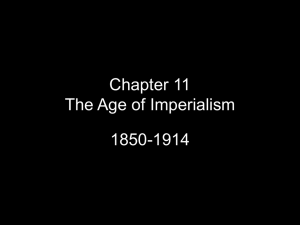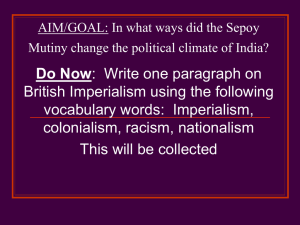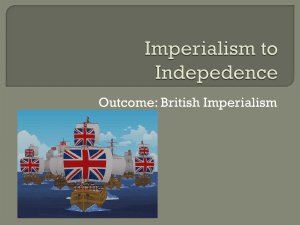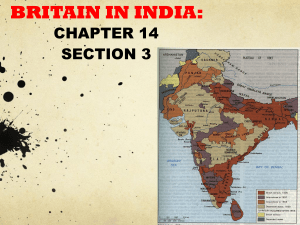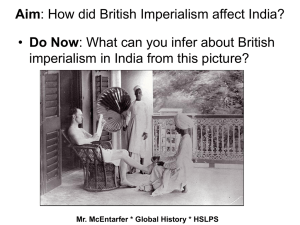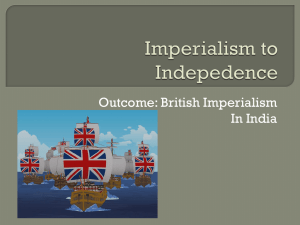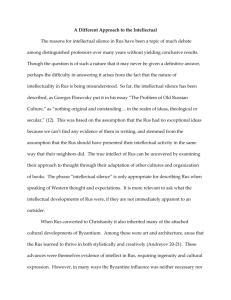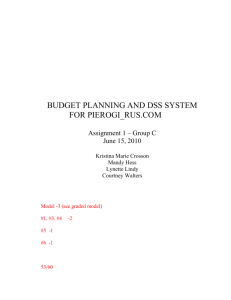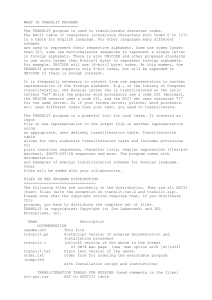Chapter 11 sec 3_4
advertisement
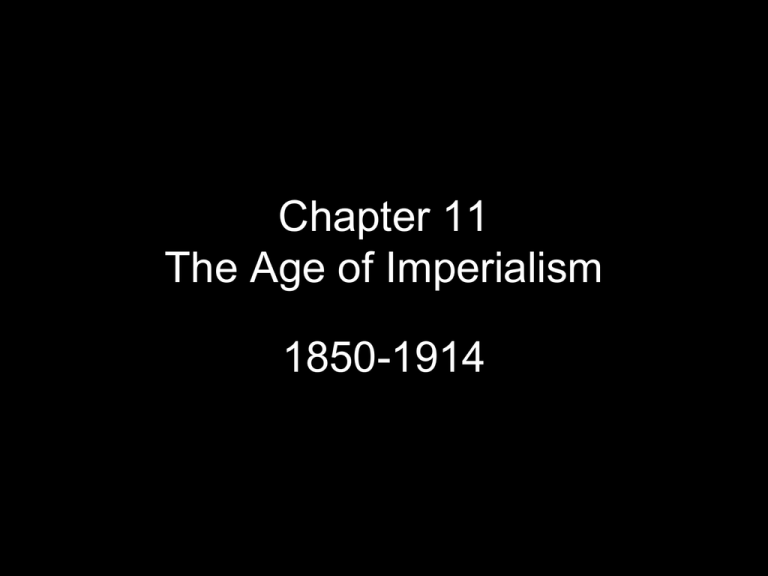
Chapter 11 The Age of Imperialism 1850-1914 Essential Question • Discuss the following questions with your neighbors and be prepared to share with the class: 1. What do you know about the Middle East? Section 3 Europeans Claim Muslim Land • Crimean War Geopolitics: taking land for its strategic location or products – Example of geopolitics – RUS attacks Ottomans to gain warmwater port on the Black Sea & access to Mediterranean Sea – RUS loses, but Ottomans are shown to be weak; still lose land b/c of rebellions • Egypt Initiates Reforms – Muhammad Ali breaks away from Ottoman control and rules Egypt – Begins series of reforms in military and economy • modernizes to keep out Euro control – Shifts Egypt agriculture from food crops to cash crops (similar to Euro colonial policies) Exploit: take advantage of/ to use Sphere of influence: an area in which an outside power claims exclusive investment or trading privileges – The Suez Canal • Egypt builds Suez Canal • Modernization creates huge debt – Brits take over financial control of canal and occupy Egypt • The exploitation of Persia – Rus wants access to Persian Gulf and Indian Ocean – Brit wants Persian oil and Afghanistan – 1907, Rus and Brit seize and divide Persia between them as spheres of influence Group Work Critical Thinking Questions In groups of 3, use your textbook and notebook and work together to answer the following questions: 1. What part did internal corruption play in the decline of Ottoman power? 2. Why did the discovery of oil in Persia increase the value of Ottoman territory? 3. In what way were the RUS, BR, and FR motivations in the Crimean War similar? 4. How was Muhammad Ali’s promotion of cotton production similar to Euro imperialists’ actions in AFR? 5. Why was the completion of the Suez Canal cause for international celebration? 6. What advantages did granting business concessions to Western countries offer Persia? 7. How did Persia’s granting of concessions eventually lead to its takeover by BR & RUS? Critical Thinking Answers 1. It led to a weakened economy and technological stagnation. 2. The oil had to pass through Ottoman land to Europe. 3. They all wanted to control Ottoman territory 4. Both substituted production of cash crops for food crops 5. It greatly decreased the time needed to travel from Euro to East AFR and Asia 6. Income, development of their resources, and participation in world events 7. Concessions allowed Western countries to establish an economic foothold in Persia, which they exploited when the Persian gov’t lost control of the country. Section 4 British Imperialism in India • East India Company Dominates Sepoy: Indian soldier – Company has its own army led by Brit officers & staffed by sepoys • Brit’s “Jewel in the Crown”, most valuable colony • British Expand Control Over India – Impact of Colonialism • Brits control political & economic power • Cash crops result in loss of selfsufficiency, famine • Indian life disrupted by missionaries and racist attitudes • Brits modernize India’s economy, improve public health Mutiny: to rebel against authority; soldiers rebel against commanding officer Cartridge: holds bullets for a rifle Arranged marriage: families decide which couples will marry while they are still children • The Sepoy Mutiny – INs rebel • Sepoys refuse to use cartridges of new rifles b/c religious reasons • Many are jailed; others mutiny – Turning point • Brits put down rebellion, take direct control of IN • Raj –period of Brit rule after India came under the Brit crown • Nationalism Surfaces in India – Ram Mohun Roy “father of modern India” • In order to move towards independence, IND needed to end traditional practices like arranged marriages Cause 1. 2. 3. 4. 5. 6. British Imperialism in India Effect East Indian troops defeated Indian forces at the Battle of Plassey after Mughal rule had become weak British establish a railroad network in India British restricted Indian owned industries such as cotton textiles and reduced food production in favor cash crops The Sepoy Mutiny occurs and uprisings spread over much of northern India Calls by reformers for India to modernize, nationalist feelings, resentment over British discriminatory policies British partition Bengal into Hindu and Muslim sections 1. East Indian company gains control of India 2. Railroads transported raw materials from interior to ports & manufactured goods from ports to interior; India becomes more profitable for Britain; India developed a modern economy and was geographically unified 3. Villagers are no longer selfsufficient; food production declines and famine sets in British government assumed direct control of India; racism and mutual distrust were intensified Indians form Indian National Congress and then the Muslim League, which eventually call for self-government 4. 5. 6. Acts of terrorism forced British to divide province in a different way to avoid open rebellion
